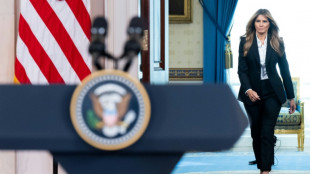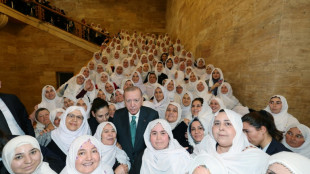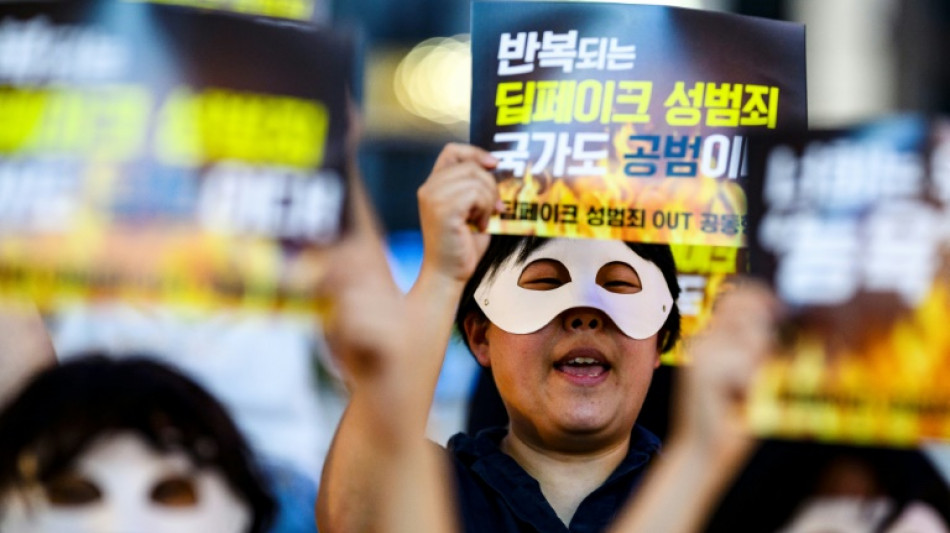
-
 Bayern and Kane gambling with house money as Gladbach come to town
Bayern and Kane gambling with house money as Gladbach come to town
-
Turkey invests in foreign legion to deliver LA Olympics gold

-
 Galthie's France blessed with unprecedented talent: Saint-Andre
Galthie's France blessed with unprecedented talent: Saint-Andre
-
Voice coach to the stars says Aussie actors nail tricky accents

-
 Rahm rejection of DP World Tour deal 'a shame' - McIlroy
Rahm rejection of DP World Tour deal 'a shame' - McIlroy
-
Israel keeps up Lebanon strikes as ground forces advance

-
 China prioritises energy and diplomacy over Iran support
China prioritises energy and diplomacy over Iran support
-
Canada PM Carney says can't rule out military participation in Iran war

-
 Verstappen says new Red Bull car gave him 'goosebumps'
Verstappen says new Red Bull car gave him 'goosebumps'
-
Swiss to vote on creating giant 'climate fund'

-
 Google to open German centre for 'AI development'
Google to open German centre for 'AI development'
-
Winter Paralympics to start with icy blast as Ukraine lead ceremony boycott

-
 Sci-fi without AI: Oscar nominated 'Arco' director prefers human touch
Sci-fi without AI: Oscar nominated 'Arco' director prefers human touch
-
Ex-guerrillas battle low support in Colombia election

-
 'She's coming back': Djokovic predicts Serena return
'She's coming back': Djokovic predicts Serena return
-
Hamilton vows 'no holding back' in his 20th Formula One season

-
 Two-thirds of Cuba, including Havana, hit by blackout
Two-thirds of Cuba, including Havana, hit by blackout
-
US sinks Iranian warship off Sri Lanka as war spreads

-
 After oil, US moves to secure access to Venezuelan minerals
After oil, US moves to secure access to Venezuelan minerals
-
Arteta hits back at Brighton criticism after Arsenal boost title bid

-
 Carrick says 'defeat hurts' after first loss as Man Utd boss
Carrick says 'defeat hurts' after first loss as Man Utd boss
-
Ecuador expels Cuba envoy, rest of mission

-
 Arsenal stretch lead at top of Premier League as Man City falter
Arsenal stretch lead at top of Premier League as Man City falter
-
Title race not over vows Guardiola after Man City held by Forest

-
 Rosenior hails 'world class' Joao Pedro after hat-trick crushes Villa
Rosenior hails 'world class' Joao Pedro after hat-trick crushes Villa
-
Brazil ratifies EU-Mercosur trade deal

-
 Real Sociedad edge rivals Athletic to reach Copa del Rey final
Real Sociedad edge rivals Athletic to reach Copa del Rey final
-
Chelsea boost top four push as Joao Pedro treble routs Villa

-
 Leverkusen sink Hamburg to keep in touch with top four
Leverkusen sink Hamburg to keep in touch with top four
-
Love match: WTA No. 1 Sabalenka announces engagement

-
 Man City falter as Premier League leaders Arsenal go seven points clear
Man City falter as Premier League leaders Arsenal go seven points clear
-
Man City title bid rocked by Forest draw

-
 Defending champ Draper ready to ramp up return at Indian Wells
Defending champ Draper ready to ramp up return at Indian Wells
-
Arsenal extend lead in title race after Saka sinks Brighton

-
 US, European stocks rise as oil prices steady; Asian indexes tumble
US, European stocks rise as oil prices steady; Asian indexes tumble
-
Trump rates Iran war as '15 out of 10'

-
 Nepal votes in key post-uprising polls
Nepal votes in key post-uprising polls
-
US Fed warns 'economic uncertainty' weighing on consumers
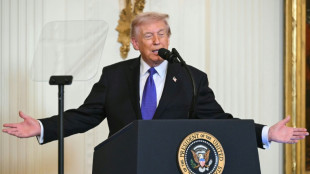
-
 Florida family sues Google after AI chatbot allegedly coached suicide
Florida family sues Google after AI chatbot allegedly coached suicide
-
Alcaraz unbeaten run under threat from Sinner, Djokovic at Indian Wells

-
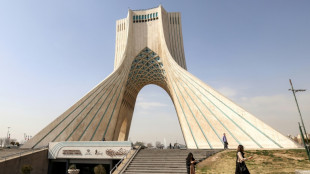 Iran's supreme leader gone, but opposition still at war with itself
Iran's supreme leader gone, but opposition still at war with itself
-
Mideast war rekindles European fears over soaring gas prices

-
 'Miracle to walk' says golfer after lift shaft fall
'Miracle to walk' says golfer after lift shaft fall
-
'Nothing is working': Gulf travel turmoil hits Berlin tourism fair
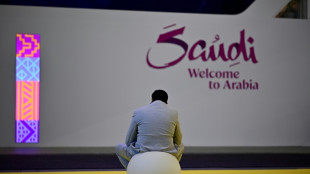
-
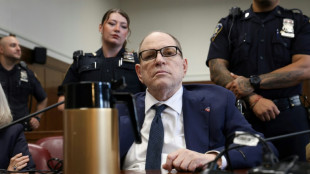 Harvey Weinstein rape retrial to start April 14: publicist
Harvey Weinstein rape retrial to start April 14: publicist
-
No choke but 'walloping', South Africa coach says of T20 flop

-
 Bayer gets preliminary approval for weedkiller class settlement
Bayer gets preliminary approval for weedkiller class settlement
-
Russia to free two Hungarian-Ukrainian POWs, Putin says
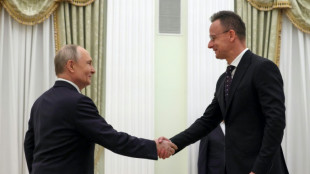
-
 Michelangelo's works hidden in 'secret room', researcher says
Michelangelo's works hidden in 'secret room', researcher says
-
Adidas shares slump on outlook, Mideast war casts shadow


Deepfake porn crisis batters South Korea schools
After South Korean authorities uncovered a sprawling network of AI deepfake porn Telegram chatrooms targeting schools and universities, teenage activist Bang Seo-yoon began collecting testimony of abuse from victims.
Many of the cases she documented followed the same pattern: schoolboys steal innocuous selfies from private Instagram accounts and create explicit images to share in the chat rooms, specifically to humiliate female classmates -- or even teachers.
Super-wired South Korea, with the world's fastest average internet speeds, has long battled sexual cyber violence, but experts say a toxic combination of Telegram, AI tech, and lax laws has supercharged the issue -- and it is tearing through the country's schools.
"It's not just the harm caused by the deepfake itself, but the spread of those videos among acquaintances that is even more humiliating and painful," Bang, 18, told AFP.
She has received thousands of reports from devastated victims since authorities in August found the first such Telegram chatrooms, typically set up within a school or university to prey on female students and staff.
Most perpetrators are teens, police say.
Deepfake prevalence is increasing exponentially globally, industry data shows, up 500 percent on year in 2023, cybersecurity startup Security Hero estimates, with 99 percent of victims women -- typically famous singers and actresses.
But while celebrities have powerful backers to protect them -- the K-pop agency behind girlband NewJeans recently took legal action against deepfake porn -- many ordinary victims are struggling to get justice, activists say.
- 'Live in fear' -
Prosecution rates are woeful: between 2021 and July this year, 793 deepfake crimes were reported but only 16 people were arrested and prosecuted, according to police data obtained by a lawmaker.
After news of the chat rooms spread, complaints surged, with 118 cases reported in just five days in late August, and seven people arrested amid a police crackdown.
But six out of seven alleged perpetrators were teenagers, police say, which complicates prosecutions as South Korean courts rarely issue arrest warrants for minors.
The chatrooms, multiple of which AFP attempted to join before being removed by moderators, have lewd names such as "the lonely masturbator" and rules requiring members to post photos of women they wish to see "punished".
Victims find themselves "sexually insulted and mocked by their classmates in online spaces", Kang Myeong-suk, head of victim support at the Women's Human Rights Institute of Korea told AFP.
"But the perpetrators often face no consequences," she said, adding that victims now "live in fear of where their manipulated images might be distributed by those around them".
"Some online comments say the victims should 'get over it' as these deepfake images are not even real," Kang said.
"But just because manipulated images aren't real doesn't mean the pain the victims endure is any less genuine."
- Victim blaming -
While overall crime rates in South Korea are generally low, the country has long suffered from an epidemic of spy-cam crimes, which led to major protests in 2018 inspired by the global #MeToo movement, eventually forcing lawmakers to strengthen laws.
Even so "the penalties issued are often trivial, like fines or probation, which are disproportionate to the gravity of the offenses", professor Yoon Kim Ji-young told AFP.
There have also been Telegram porn scandals before, most notably in 2020 when a group blackmailing women and girls to make sexual content for paid chatrooms was uncovered. The ringleader was jailed.
But things have not improved.
President Yoon Suk Yeol's dismissive views on feminism -- which he has blamed for the country's low birthrate -- have signalled to men it is "okay to be hostile or discriminatory towards women", Yoon Kim said.
South Korean police blame low prosecution rates on Telegram, which is famed for its reluctance to cooperate with authorities. Its founder was recently arrested in France for failing to curb illegal content on the app.
But one victim of a 2021 deepfake porn incident told AFP that this was no excuse -- many victims manage to identify their attackers themselves simply by determined sleuthing.
The victim, who requested anonymity, said it had been a "huge trauma" to bring her assailant to justice after she was attacked in 2021 with a barrage of Telegram messages containing deepfake images showing her being sexually assaulted.
Her attacker was a fellow student at the prestigious Seoul National University, who she had rarely interacted with but always thought was "gentle".
"It was hard to accept," she said, adding police required her to collect all the evidence herself, then she had to lobby hard for a trial, which is now ongoing.
"The world I thought I knew completely collapsed," she said in a letter she plans to submit to the court on September 26.
"No one should be treated as an object or used as a means to compensate for the inferiority complexes of individuals like the defendant, simply because they are women."
C.Stoecklin--VB

